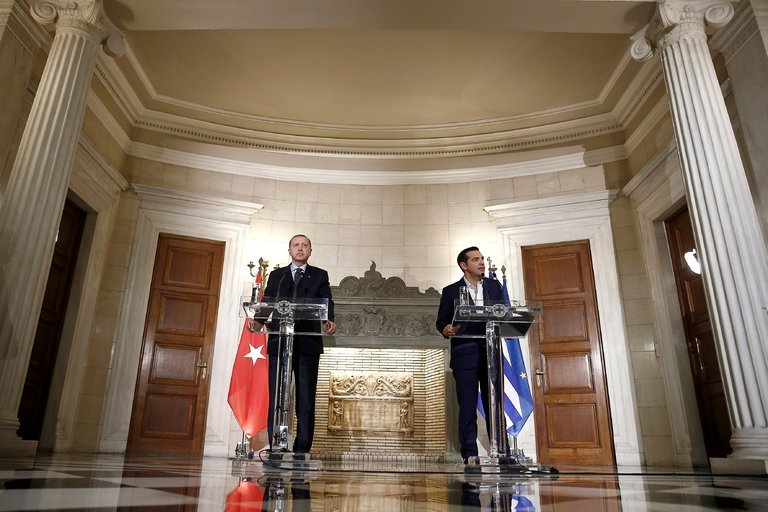So why now?
By Iliana Magra
Recep Tayyip Erdogan became the first Turkish president to visit Greece in 65 years, when he met with the Greek prime minister and president. He had twice visited the country as a prime minister, but his first visit as the Turkish head of state comes at a time of increasing diplomatic isolation for Turkey.
The last president of Turkey to visit Greece, Celal Bayar in 1952, promoted the stabilization of borders between the two countries. But Mr. Erdogan raised the prospect of upsetting the territorial balance between them.
So how did we get here?
Why is a Turkish president visiting now? Mr. Erdogan’s visit on Thursday is the first by a Turkish head of state since “the honeymoon period of Greek-Turkish relations that spanned from the 1930s to the early 1950s,” Soner Cagaptay, the director of the Turkish research program at the Washington Institute, said in a telephone interview.
However, Mr. Erdogan’s position as president, which was consolidated in a referendum in April, is substantially different from that of his predecessors. Previous Turkish presidents were symbolically important, but they did not enjoy the executive powers that Mr. Erdogan now does. “No president before him had the power to drive foreign policy, none of them,” Fadi Hakura, the manager of the Turkey project at Chatham House, a think tank based in London, said in a telephone interview.
The significance of Mr. Erdogan’s visit also lies in its timing: He reached out to a historically antagonistic neighbor at a moment when he finds himself and Turkey isolated abroad. Besides a high-profile trial in New York in which he is directly implicated, the past year has seen Turkey’s relations with the West deteriorate because of tensions with the United States, the European Union, Germany and Austria, among others.
“Mr. Erdogan needs a P.R. success story to break Turkey’s diplomatic isolation. He needs a photo opportunity with a country that is a member of NATO and the European Union,” Thanos Dokos, the director of Eliamep, an Athens-based think tank, said in a telephone interview. Other experts suggested that Mr. Erdogan was reaching out to the Balkan countries, after failing in a plan to render Turkey a significant player in the Middle East.
“He is looking for greatness for Turkey. He wants to make Turkey great again, he wants to make it a star country, which is why he is now directing his attention to the Balkans,” said Mr. Cagaptay, who recently wrote a book on Mr. Erdogan titled “The New Sultan: Erdogan and the Crisis of Modern Turkey.”
How has Greece and Turkey’s relationship changed? In the 65 years since Turkey’s last president visited Greece, tensions have peaked several times. In September 1955, Turkish nationalists targeted the Greek minority in Istanbul, after news of a dynamite explosion near the Turkish consulate in Thessaloniki, a city in northern Greece.
“Tens of thousands of young Turks roamed through the city, smashing Greek store windows, wrecking store interiors and overturning automobiles,” read a front-page article in The Times in 1955.
Relations between Greece and Turkey dramatically deteriorated after the Turkish invasion of Cyprus in July 1974, which came a few days after a Greek-Cypriot guerrilla group had overthrown Archbishop Makarios, the island’s longtime leader.
Turkish officials had feared a Cypriot union with Greece, whose military government at the time had backed the coup. About 160,000 Greek Cypriots were displaced in the crisis. In late January 1996, both Turkey and Greece claimed the sovereignty of a pair of uninhabited Aegean Islands, known as Imia in Greece and as Kardak in Turkey. Greek and Turkish ships surrounded the islands, a confrontation that calmed only after NATO intervened.
An earthquake that devastated Turkey in the late summer of 1999 prompted a rapprochement between the two countries. “Big earthquakes took place in both countries at the same time, humanitarian help was offered and the respective societies worked together,” Mr. Hakura said. Turkish and Greek foreign ministers saw an opportunity for reconciliation, the so-called “earthquake diplomacy.” In the aftermath, there was a dramatic improvement in relations.
Does this visit matter?
With Greece and Turkey still at odds on many important issues, “it’s a breath of fresh air in Greek-Turkish ties that they’re currently reaching out to each other,” said Mr. Cagaptay. These issues include migration, the Cyprus dispute, Turkey’s stalled accession process for European Union membership Greece supports moving the process on and the airspace and Aegean disputes that have been plaguing their relationship for years.
“The two countries could do so much if they worked closer together. There is untapped financial potential,” Mr. Cagaptay suggested. Any progress is fragile, given the longstanding animosity between the two countries. That was amply demonstrated when Mr. Erdogan raised the prospect of an “update” of the 1923 Treaty of Lausanne, which defined Turkey’s borders with its neighbors.
The notion did not go down well with his Greek hosts. “I don’t think that Greece has carefully thought about what an ‘update’ of the Lausanne treaty would mean for the country, as it does not consider this to be a matter for deliberation,” Dimitrios Triantaphyllou, an associate professor of international relations at Kadir Has University in Istanbul, said in a telephone interview.
But Mr. Erdogan’s words were most likely intended for domestic consumption in Turkey, he said. “He is an international leader always talking to a national audience,” Mr. Triantaphyllou said. “He’s interested in demonstrating that Turkey is a key player for stabilization, that it should be respected and that it’s in control.”
‘Courtesy New York Times’.


